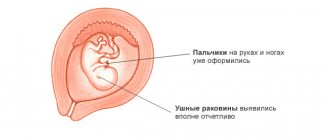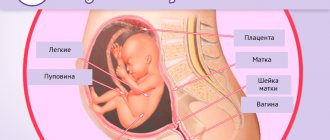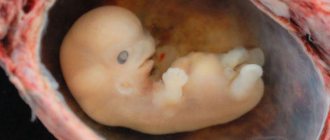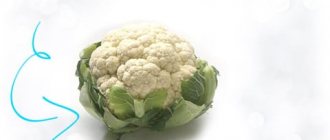How does a pregnant woman's appearance change at 11 weeks?
The first trimester continues.
At the 11th week of pregnancy, the expectant mother’s belly continues to slowly grow, the uterus increases in size, the mammary glands become engorged, and the nipples become even more sensitive. Metabolism increases in the woman’s body, associated with the increasing need of the fetus for nutrients. Some pregnant women note the appearance of sweating during this period, as well as a constant feeling of thirst. Right now, most mothers’ nails become brittle and their hair becomes dull and prone to falling out. The skin also undergoes changes during pregnancy: the work of the sebaceous glands increases, thereby causing the appearance of unwanted oily sheen, acne and enlarged pores. Some pregnant women at 11 weeks experience the exact opposite picture: hormones have a beneficial effect on the condition of hair, skin and nails.
This difference is explained by the individual characteristics of the body; the nutrition of the pregnant woman during this period is also of considerable importance. Correctly selected vitamins for pregnant women, as well as various cosmetic procedures that are not prohibited by your doctor, will help solve the problem.
Diarrhea during pregnancy: what to do, causes of diarrhea
Every person has experienced diarrhea at least once. Loose stools, pain and gurgling in the abdomen cause a lot of discomfort. However, after a couple of days, a healthy person, in the absence of complications and the disappearance of symptoms, will decide that he ate something wrong and will forget about everything. If we are talking about a woman carrying a child, then the level of anxiety increases significantly.
Causes of diarrhea during pregnancy
Diarrhea during pregnancy poses a threat to the fetus
Dehydration, cramping and abdominal pain can lead to premature labor or harm the baby. Therefore, it is very important to know how to stop diarrhea during pregnancy, what to do and how to avoid it. First, let's find out why diarrhea occurs in pregnant women:
- Toxicosis. We are used to thinking that early toxicosis (before 12 weeks) is expressed only in nausea, but it may well be accompanied by diarrhea. In this case, the woman will not feel severe pain. The stool will simply become faster and thinner, without foreign inclusions, without changing color or increasing in volume. In this case, there is no need to worry, just eat right and follow a drinking regime.
- Vitamins. Doctors prescribe vitamins to all pregnant women, without exception. Courses can be interrupted and adjusted, but everyone takes vitamins. This is explained by the fact that during this period the body especially needs additional vitamins and microelements. However, he may react to them unexpectedly. If you notice that diarrhea begins after taking the pill, stop taking it and contact your doctor.
- Hormones. Hormonal changes also affect intestinal function. In the early stages this is alarming, but just before birth it is normal. The intestines cleanse themselves.
- Growing uterus. The uterus is constantly enlarging and putting pressure on other organs. Sometimes this provokes various problems such as diarrhea, cholecystitis and others. It is necessary to monitor the color of stool and undergo regular tests to monitor the functioning of internal organs.
- Microorganisms. We cannot exclude the fact that pathogenic bacteria and viruses entered the woman’s body, which caused diarrhea. This condition is dangerous for the fetus. Therefore, in case of severe diarrhea, nausea, vomiting, or fever, you should immediately consult a doctor.
- Nutrition. The presence of foods that have a laxative effect can also cause diarrhea. For example, prunes, which are eaten for anemia, fruits, berries. In this case, diarrhea will not be too frequent and severe.
Read: Vomiting and diarrhea during pregnancy: when should you sound the alarm?
How to treat diarrhea during pregnancy?
You should not self-medicate during pregnancy!
Under no circumstances should you self-medicate or take any medications or folk remedies without the knowledge of your doctor. Most medications are prohibited for pregnant women. This is especially true in the early stages. There is no need to think that drinking plenty of water weakens and thins the stool.
If you have diarrhea, you need to drink more than usual to avoid dangerous dehydration. You can take Smecta and Regidron. The first removes toxins, and the second restores water balance in the body. You need to take even such harmless drugs after first studying the instructions and following the dosage.
If you have mild diarrhea, you can do without them altogether.
Your doctor can recommend safe folk remedies that will help you cope with diarrhea without causing allergies. For example, you can dilute 1 teaspoon of starch in a glass of lukewarm water and drink it at a time. This recipe will help stop stool liquefaction. However, if you experience abdominal pain and continued bouts of diarrhea, you should consult a doctor.
- You can drink a decoction of pomegranate peel. It strengthens and does not harm the body. You can drink it not in its pure form, but add it to tea. Blackberry leaves have the same property.
- Walnut leaves are used as an astringent for diarrhea. They contain a lot of vitamins. They even help stop bleeding from stomach ulcers.
- Sometimes diarrhea is a consequence of stress and nervous tension. If this is the case, the pregnant woman needs to take a sedative, which the doctor will prescribe (mint decoction, motherwort tablets, etc.). You should not take such drugs without a doctor’s recommendation; some herbs included in sedatives increase the tone of the uterus and can cause a miscarriage.
- Loperamide is not prohibited during pregnancy, but you should consult your doctor before taking it. This drug quickly stops diarrhea, but can cause constipation if the dosage is overdone.
It is important to distinguish between diarrhea caused by pregnancy itself and a condition dangerous to the body. In the second case, diarrhea is repeated frequently, the stool is very liquid, the consistency of water resembles, and the woman experiences abdominal pain, cramps, and nausea.
Why is diarrhea dangerous during pregnancy?
Dehydration - danger of diarrhea!
How dangerous diarrhea is for the fetus and the health of the woman herself can only be judged by considering each specific case. Diarrhea may not be dangerous at all if it is a manifestation of toxicosis and does not cause pain or occurs immediately before childbirth.
Mild and infrequent diarrhea should not be a cause for concern. But if the cause of diarrhea is viruses and bacteria, this can cause significant harm to the child, who also receives some toxins through the blood.
For this reason, a pregnant woman is advised to avoid dangerous foods such as mushrooms, rolls with raw fish, etc.
The most dangerous thing that can happen with diarrhea is dehydration. With prolonged diarrhea, the body loses a large amount of moisture. Diarrhea that occurs more than 5 times a day is considered dangerous.
With such a loss of water, the amount of vitamins and microelements in the body is significantly reduced, which affects the development and condition of the child. Severe dehydration can lead to miscarriage or serious birth defects.
How do you know if dehydration has occurred? First, you need to count how many times a woman went to the toilet per day. Secondly, watch your urination. When dehydrated, the urge to urinate disappears altogether or is very rare, and the urine darkens.
A pregnant woman is constantly thirsty, feels dry mouth, dizziness, fatigue, drowsiness, and weakness. It is urgent to stop the loss of fluid and begin to replenish it with the help of Regidron.
The danger of diarrhea also depends on its severity and duration. One day of diarrhea will not cause significant harm to the body. If diarrhea lasts for about two weeks, serious treatment should be taken.
Most often, such prolonged diarrhea is caused by bacteria that are dangerous for the child. Diarrhea for more than two weeks is considered persistent and especially dangerous. A pregnant woman needs to be examined and the cause identified. Chronic diarrhea lasts more than a month.
In this case, it is usually not bacteria that are to blame, but intestinal diseases, such as lazy bowel syndrome, inflammation, and colitis.
Diet and prevention
Diarrhea during pregnancy is a reason to seek medical help
Usually, when you have diarrhea, it is recommended not to eat at all, but only drink. However, fasting may not be beneficial for a pregnant woman. You can eat low-fat broths. They are nutritious and at the same time replenish the lack of fluid in the body.
When the first symptoms subside, you can add crackers to the broth. Unleavened porridges are also healthy. Especially oatmeal and rice. They normalize intestinal function, rice strengthens and helps stop loose stools. Sometimes it is even recommended to drink rice water for diarrhea.
It envelops the walls of the stomach and helps relieve inflammation.
Read: Why does a child poop often and how to help him in this case
If you have diarrhea, you should limit the consumption of meat, dairy products, fresh fruits and vegetables, as well as anything that enhances the processes of fermentation and gas formation. Fatty, fried, salty and spicy foods are harmful for pregnant women.
Even if there is no diarrhea, all of the above can provoke it. And hot spices actually cause contraction of the uterine muscles. Pregnant women who have already encountered the troubles of diarrhea will try to avoid this phenomenon in the future.
To do this you need to follow a few simple rules:
- Wash your hands as often as possible: after visiting the street, public transport, the toilet, before eating and preparing food.
- Take prenatal vitamins recommended by your doctor. They will strengthen the body and normalize the functioning of internal organs.
- Eat properly. You need to eat only fresh, natural foods, forget about chips, fast food, hot sauces, fatty meats, soda, and alcohol.
- Avoid visiting restaurants and cafes. Even your favorite cafe can let you down, because you cannot know how clean the kitchen there is and whether sanitary standards are observed. Try to cook at home from fresh ingredients and avoid buying pies and shawarma on the street from dubious stalls.
A pregnant woman should not drink carbonated drinks, powdered juices, or coffee. These drinks should be avoided even if there is no diarrhea.
Safety rules will help avoid digestive upset, which can lead to very unpleasant consequences for mother and child.
What to do if you have diarrhea? This video will teach you not to panic:
Select it and press Ctrl+Enter to let us know.
Tell your friends! Share this article with your friends on your favorite social network using social buttons. Thank you!
Tweet
Telegram
Class
What's up
Source: https://PishheVarenie.com/ponos/ponos-pri-beremennosti-chto-delat-prichiny-diarei/
Baby activity at 11 weeks of pregnancy
At 11 obstetric weeks, the little man growing inside you develops a sense of smell: he can already smell the food you eat. The baby responds to his mother’s sudden movements and covers his face with his hands, stretches and becomes active. At the 11th week of pregnancy, the fetus can turn over 360 degrees and push off from the walls of the uterus, but the expectant mother does not yet feel its movements - this will happen later.
The 11th week of pregnancy is the time when your doctor can prescribe your first screening. This is necessary to assess fetal development, identify pathologies (such as Down syndrome, Patau syndrome, fetal neural tube defect, etc.) and the course of your pregnancy in general. Ultrasound at the 11th week of pregnancy is not a mandatory procedure; some pregnant women refuse to undergo it, however, obstetricians-gynecologists, geneticists and neonatologists strongly recommend not to avoid this study.
3D ultrasound at 11 weeks of pregnancy
Weight gain at 11 weeks of pregnancy ranges from 0.8 kg (with a BMI of more than 26) to 1.9 kg (with a BMI of less than 19.8). To calculate your individual weight gain at 11 weeks, use the pregnancy weight gain calculator.
How pregnancy develops at 11 weeks
By the beginning of the third lunar month of life, the child’s length is about 50 millimeters. All the main organs of the child are already formed, but they continue to improve both in their structure and in their functioning:
- red blood cells are formed in the spinal cord;
- the liver, which makes up a tenth of the Baby’s body, is functioning. This important organ produces proteins that go into building the body;
- the gallbladder produces bile;
- the pituitary gland produces hormones;
- the connections between bones and muscles are strengthened, and the Baby’s movements become more and more energetic;
- fingers and toes appear;
- the cartilaginous auricle is formed;
- all major areas of the brain are formed;
- The nervous system develops very intensively: several thousand nerve cells are added every second!
- the number of connections between nerve cells and muscles increases many times - the nervous system begins to coordinate the work of muscles;
- the sense of touch improves, almost the entire surface of the body becomes sensitive to touch;
- the rudiments of baby teeth appear;
- eyebrows and eyelashes are noticeable on the face;
- the developing placental-umbilical cord merges with the Baby’s circulatory system.
How much amniotic fluid should there be?
The quality of amniotic fluid (amniotic, from the Greek amnion - fetal membrane) fluid is an important component of the successful development of the Baby. It contains many components: proteins, carbohydrates, sugar, fats and hormones that nourish the child until birth. What does “nourish” mean? Here are just a few facts:
- A certain amount of amniotic fluid is absorbed through the baby's skin before 24 weeks of pregnancy (later the skin becomes impermeable to amniotic fluid as it becomes keratinized).
- Already from 9 weeks, taste buds appear on the Baby’s tongue, and he begins to swallow amniotic fluid. In the last months of pregnancy, the fetus swallows about 20 ml of amniotic fluid in 1 hour.
Both in quantity and quality, amniotic fluid changes throughout pregnancy. So, if at 10 weeks the Baby needs 30 ml of amniotic fluid, which is similar in quality to plasma (the liquid part of the mother’s blood without cells), then by 18 weeks it already requires 400 ml, and two weeks before birth its volume is about 1500 ml . In addition to the components listed above, the amniotic fluid also contains exfoliating epithelial cells of the baby’s skin, vellus hair - lanugo, which covers the baby’s entire body until the last months before birth, secretions of his sebaceous glands, etc. The concentration of one or another component of amniotic fluid depends on the duration of pregnancy.
In order for the Baby to be comfortable in this “nutrient medium”, it must not only be saturated with useful substances, but also “renewed”, including because during the day in the last months before birth, the Baby secretes from 600 to 800 ml into the amniotic fluid urine. This means you should:
- drink at least 2-2.5 liters of liquid per day;
- It is better to completely exclude carbonated drinks from the diet - at least until the end of pregnancy and breastfeeding, since they are not beneficial for either the Baby or you;
- Doctors readily recommend drinking vitamin teas during pregnancy - the simplest and most effective way to extract useful and palatable substances from plants. Plant helpers contain many valuable substances necessary for a growing person;
- It is better to dilute fruit juices with water - this way they are better absorbed by the body, while reducing the load on the organs that secrete enzymes for digesting the juice, for example, on the pancreas.
Treatment
How to treat diarrhea in a pregnant woman? In an interesting situation, not every remedy for diarrhea is allowed. And folk recipes in this case can do more harm than good. Consultation with a doctor is a prerequisite. Only he can decide how to treat diarrhea during pregnancy in this particular case.
Medicines
- The most effective medications for diarrhea during pregnancy are enterosorbents. They remove toxins, waste and harmful substances from the body, and, in addition, envelop the irritated mucous membrane, calming peristalsis. Almost all sorbents are allowed to be taken while waiting for the baby; they will not harm either him or the mother.
- We promised to talk about means to prevent dehydration, which can develop in pregnant women from diarrhea. We are talking about rehydration solutions, such as Ringer's solution, Regidron, Gastrolit, etc. The use of such solutions for diarrhea will not only protect the body from loss of moisture, but will also restore salts and trace elements lost with water and feces. Let us remind you here that in case of stool upset, you need to drink at least 300 ml of liquid after each bowel movement (amount for those who do not have problems with edema).
Folk remedies
- How to stop diarrhea during pregnancy using folk recipes? The safest, mildest remedy is rice water. This drink not only strengthens, but also softens the mucous membrane, and also plays the role of a sorbent.
- Tablets that inhibit peristalsis are taboo for pregnant women. Only after 35 weeks is it permissible to take Loperamide, but only in cases where the benefit outweighs the risk. Another simple recipe can be an alternative to tablets: you need to dilute a spoonful of starch in half a glass of warm water and drink.
- A great way to stop diarrhea is a drink made from dry pomegranate peels or an infusion of walnut septa.
Diet
- In case of stool disorder, it is necessary, in addition to fatty, spicy, generally unhealthy foods, to exclude fresh fruits and vegetables from the diet.
- Do not consume carbonated drinks, as well as foods that increase gas formation (legumes, mushrooms)
- Food should be neither cold nor scalding hot
- It’s great if the dishes are served pureed.
Prevention
- The main condition for prevention is compliance with hygiene standards - a pregnant woman must maintain both the cleanliness of her body and the cleanliness of her surroundings
- It is necessary to abandon events involving large crowds of people
- Food and water must be temperature-treated
- In addition, the food must be of high quality and meet its expiration date.
About
Tests and studies during pregnancy
Ultrasound (ultrasound examination) - 5 weeks after the first day of the last menstruation, according to indications.
Diagnosis of pregnancy, exclusion of ectopic pregnancy. Blood test for AIDS (HIV), syphilis (RW), hepatitis B - when registering for pregnancy (antenatal clinic, specialized medical center, advisory clinic at a maternity hospital, etc.). These diseases can complicate the course of pregnancy and require a special approach to patient management.
Analysis for blood group and Rh factor - when registering for pregnancy. If there is a risk of Rh conflict (if the woman has a negative Rh factor and the husband has a positive one), pregnancy requires special monitoring.
General and biochemical blood test, blood sugar test - when registering for pregnancy. They give an idea of the general health of the pregnant woman and possible chronic diseases.
General urine test - when registering for pregnancy, then before each visit to the doctor. Indicates the quality of kidney function.
Vaginal smear - when registering for pregnancy. Assessment of microbial flora, exclusion of urogenital infections.
Tests for urogenital infections - according to indications .
Hormone analysis - according to indications .
Good to know
Expectant mother in front of the mirror: appearance during pregnancy
I believe - I don't believe. Pregnancy and superstitions
Is it possible for pregnant women to dye their hair and get nails extended?
Safe hair removal during pregnancy
Can pregnant women use household chemicals?
How to care for your hair during pregnancy and after childbirth
Is it possible for a pregnant woman to paint her nails?
Is it possible to get artificial nails while pregnant?
Neither more nor less... How much amniotic fluid is needed?
All texts for pages about mother and baby were kindly provided by RAMA Publishing - these are chapters from the book by Svetlana Klaas “Your Favorite Little Man from Conception to Birth”, reviewer Irina Nikolaevna Kononova, Candidate of Medical Sciences, Associate Professor of the Department of Obstetrics and Gynecology of the Ural State Medical Academy (Ekaterinburg).
What does dull, pulling, point or cutting pain in the abdomen indicate?
Stomach pain during pregnancy is due to changes in the body, in organs associated with hormonal changes, changes in the position of internal organs, and obstetric pathologies.
Many types of these sensations do not pose a threat to the health of the mother or the condition of the fetus. Others cause significant harm and even death to the woman and the unborn child.
Pain is a reaction of the nervous system to stimuli. A symptom of many diseases, including obstetric pathologies during pregnancy. A pregnant woman experiences hormonal changes and a restructuring of many systems. They are also accompanied by this feeling.
If discomfort and pain occur, it is better to consult with your doctor about the nature of these sensations and appropriate treatment. During pregnancy, a woman is responsible not only for her own health, but also for the health of the baby.
Nature has determined that the mother’s body tries to protect the fetus from all negative influences. A plug formed from mucus in the cervix prevents pathogenic microorganisms from entering.
Umbilical cord nutrition is formed in such a way that harmful chemical compounds do not enter the fetus. The uterus itself protects the child from external mechanical influence.
At the same time, during the period of bearing a baby, the woman herself may regularly experience pain of varying intensity and nature. Each type of discomfort indicates the presence of different pathological conditions, with the exception of harmless obstetric ones associated with changes in the maternal body and preparation for childbirth.
Based on the nature, intensity of pain, and gestational age, we can talk about how dangerous the condition is.
For example, pulling, extending to the lower back and groin, may indicate a risk of miscarriage. An additional sign of the condition will be the presence of bloody discharge.
In this case, you should immediately seek medical help and undergo an examination. If you delay visiting a doctor, the frequency of contractions will become more frequent and spontaneous miscarriage will occur.
Uterine tone is dangerous regardless of how early it was diagnosed. The fetus may experience a lack of oxygen and incoming nutrients. The woman feels a sharp pain like contractions. The solid state of the uterus and lower abdomen is recorded.
In case of injury, late toxicosis, or stress, placental abruption may occur. The condition is accompanied by acute pain in the lower abdomen. Often there is internal bleeding without external manifestations in the form of discharge. Urgent hospitalization and surgical intervention are required. Without help, death will occur.
Cramps accompanied by dizziness at five to twelve weeks can be a symptom of an ectopic pregnancy. For a number of reasons, the egg was unable to enter the uterus and became embedded in the fallopian tube.
As a result of the rapid growth rate of the fertilized egg, severe pain occurs. The woman is sent for an ultrasound examination. An operation to terminate the pregnancy is prescribed. Lack of medical care will result in death for the pregnant woman.
A number of non-gynecological problems also contribute to the occurrence of unpleasant sensations in the lower abdomen:
- Disruption of the gastrointestinal tract. Additional symptoms: bitterness in the mouth, tingling in the lower abdomen, heartburn.
- Inflammation of the bladder and urinary tract. Symptoms: discomfort and burning when urinating, increased frequency of the urge to urinate, increased body temperature.
- Seasonal colds. They are accompanied by headaches, nasopharyngeal congestion, aching bones, and fever.
- Inflammation of the appendix (appendicitis). An acute condition in which severe vomiting occurs, weakness, and a strong increase in temperature are detected. Surgery is used to remove the inflamed area. This procedure is safe for a pregnant woman. Abdominal laparotomy appendectomy is used if peritonitis is suspected and less invasive laparoscopy is used if there are no signs of peritonitis. A course of rehabilitation therapy is prescribed.









